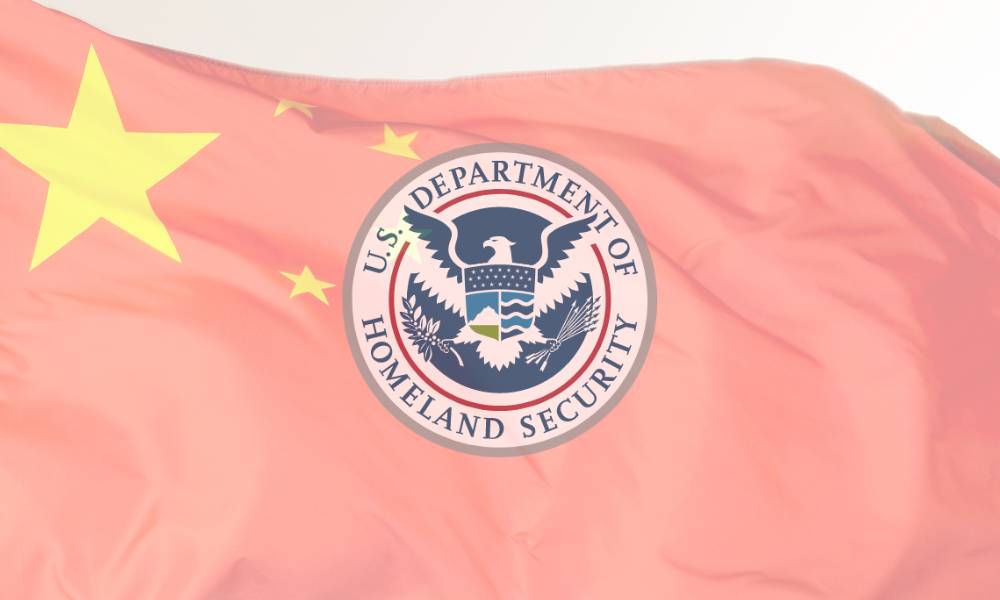
U.S. Customs and Border Protection (CBP) issued five Withhold Release Orders (WRO) on products from the People’s Republic of China (PRC). The products subject to the WROs are produced with state-sponsored forced labor in the Xinjiang Uyghur Autonomous Region, where the Chinese government is engaged in systemic human rights abuses against the Uyghur people and other ethnic and religious minorities.
“By taking this action, DHS is combating illegal and inhumane forced labor, a type of modern slavery, used to make goods that the Chinese government then tries to import into the United States. When China attempts to import these goods into our supply chains, it also disadvantages American workers and businesses,” said Acting DHS Deputy Secretary Ken Cuccinelli. “President Trump and this Department have, and always will, put American workers and businesses first and protect American citizens from participating in these egregious human rights violations.”
“The Trump Administration will not stand idly by and allow foreign companies to subject vulnerable workers to forced labor while harming American businesses that respect human rights and the rule of law,” said Acting CBP Commissioner Mark A. Morgan. “Today’s Withhold Release Orders send a clear message to the international community that we will not tolerate the illicit, inhumane, and exploitative practices of forced labor in U.S. supply chains.”
The new WROs direct CBP Officers at all ports of entry to withhold release on the following goods:
- All products made with labor from the Lop County No. 4 Vocational Skills Education and Training Center in Xinjiang Uyghur Autonomous Region, China. Information reasonably indicates that this “re-education” internment camp, which is often called a Vocational Skills Education and Training Center, is providing prison labor to nearby manufacturing entities in Xinjiang. CBP identified forced labor indicators including highly coercive/unfree recruitment, work and life under duress, and restriction of movement.
- Hair products made in the Lop County Hair Product Industrial Park in Xinjiang Uyghur Autonomous Region, China. Information reasonably indicates this site is manufacturing products with forced labor of the Uyghur people and other minority ethnic groups who are detained in “re-education” internment camps in Xinjiang. CBP identified forced labor indicators including highly coercive/unfree recruitment, work and life under duress, and restriction of movement.
- Apparel produced by Yili Zhuowan Garment Manufacturing Co., Ltd. and Baoding LYSZD Trade and Business Co., Ltd in Xinjiang Uyghur Autonomous Region, China. Information reasonably indicates that these entities use prison and forced labor in apparel production. CBP identified forced labor indicators including the restriction of movement, isolation, intimidation and threats, withholding of wages, and abusive working and living conditions.
- Cotton produced and processed by Xinjiang Junggar Cotton and Linen Co., Ltd. in Xinjiang Uyghur Autonomous Region, China. Information reasonably indicates that this entity and its subsidiaries use prison labor in their raw cotton processing operations in Xinjiang. Cotton-processing factories and cotton farms in this region are prison enterprises that use convict labor.
- Computer parts made by Hefei Bitland Information Technology Co., Ltd. in Anhui, China. Information reasonably indicates that Hefei Bitland uses both prison and forced labor to produce electronics. CBP identified forced labor indicators including abuse of vulnerability, restriction of movement, isolation, and intimidation and threats.
“The series of actions CBP has taken against imports from China demonstrates the pervasive use of unethical and inhumane labor conditions in China, and CBP will not turn a blind eye,” said Brenda Smith, Executive Assistant Commissioner of CBP’s Office of Trade. “Allowing goods produced using forced labor into the U.S. supply chain undermines the integrity of our imports. American consumers deserve and demand better.”
In Fiscal Year 2020, CBP has issued an unprecedented 12 WROs in a single fiscal year, including 8 WROs on products from China. All WROs are publicly available and listed by country on CBP’s Forced Labor Withhold Release Orders and Findings webpage.
Section 307 of the Tariff Act of 1930 (19 U.S.C. 1307) prohibits the importation of all goods and merchandise mined, produced, or manufactured wholly or in part in any foreign country by forced labor, convict labor, or/and indentured labor under penal sanctions, including forced child labor. CBP combats import risks, detects high-risk activity, deters non-compliance, disrupts fraudulent behavior, and thoroughly investigates allegations of forced labor.
CBP receives allegations of forced labor from a variety of sources, including the general public. Any person or organization that has reason to believe merchandise produced with the use of forced labor is being, or likely to be, imported into the United States can report detailed allegations by contacting CBP through the e-Allegations Online Trade Violation Reporting System or by calling 1-800-BE-ALERT.


Chattooga Local News
Felon who robbed a Fort Oglethorpe restaurant sentenced to 11 years in prison

Chattooga Opinions
The Joy the Journey: Our True Champion

Bulloch Public Safety
01/26/2026 Booking Report for Bulloch County

Bulloch Public Safety
02/09/2026 Booking Report for Bulloch County

Bulloch Public Safety
02/16/2026 Booking Report for Bulloch County

Bulloch Public Safety
02/02/2026 Booking Report for Bulloch County

Bulloch Public Safety
01/30/2026 Booking Report for Bulloch County







